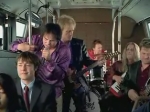Boob-obsessed fans of Lindsay Lohan will be happy to know the "Mean Girls" star will soon be seen in handbag designer Dooney and Bourke's advertising campaign. Lohan will appear in a national U.K ad campaign for the designer's new heart and charm handbag collection, available in August.
Following Karen Jacobs leaving her position as head of Starcom's print investment group four months ago, Andrew Swinand, formerly group client VP at the agency, has been named the new print head. This move completes a restructuring of the agency's print buying group.
Notably, Swinand says magazines are complacent and need to adapt to marketer's needs including the bending of the line between church and sate. While it's to be expected that the medium adapt a bit the changes in the ad industry, the thought of full on editorial brand integration within magazines in a scary thought.
Be sure to listen to Howard Stern at 8:30 AM Wednesday for a big announcement. FMBQ thinks the announcement will revolve around Stern's signing on to new stations replacing the six Clear Channel stations that dumped him. Perhaps. More likely, it will revolve around his plans for the future and what he plans to do when his contract expires. In any event, it will sure make for an exciting morning.
UPDATE: Here's the news. He started by politely slamming the press for their slanted coverage of him. He reviewed his 25 years of controversy leading up to the whole Super Bowl thing. He claims that event had no negative effect on anyone but acknowledged that it was not appropriate for a so-called "family" show. He said the event gave the government an excuse to "freak out." He questioned FCC Chairman Powell's credentials.
He went on to claim Clear Channel is "in bed" with Bush. He then reviewed his feelings about Bush. He said Clear Channel's removal of him from six stations had a chilling effect on broadcasting and the FFC's attack on him is a "witch hunt." He says no one cares the first amendment is being eaten away.
He's considering satellite radio saying it may be the future of radio. Satellite promises "no censorship." He doesn't want to simply be able to swear but he wants to be able to express himself freely. That said, he doesn't have definitive plans to move to satellite.
Clear Channel has "thrown me under the bus" Stern said referring to Clear Channel's throwing him off the six stations. He also appreciates Infinity's support of him.
The big news is he's not going to satellite but will go back on the air in nine markets including Pittsburgh, San Diego, Palm Beach, Rochester, and Orlando. He's also adding Houston, Austin, and Fresno. There's a few more markets as well. He says he will gleefully slam Clear Channel in the ratings in these markets.
Even though Stern will return to these markets, he still feels there's a very good chance he will somehow be thrown off the air in the near future. He says listeners, ratings and advertisers should decide whether he should stay on the air, not the FCC. It should be market-driven, not politically-driven.
If you're a fan of 80's rock band Survivor, you'll love this commercial for Starbucks. To promote its canned DoubleShot, Survivor gives a Starbucks coffee drinker a little morning motivation with its hit song "Eye of the Tiger."
Note: Sorry, had the band name and song title incorrect before.
MarketingVOX reports email marketing firm Return Path has acquired NetCreations. NetCreations President Michael Mayor will stay on and continue to head the division.
Underscore Marketing's Tom Hespos writes in OnlineSpin about the first chapter of Ad Age Editor Scott Donaton's new book Madison & Vine. The chapter discusses product placement and integration - fancy terms for bribing producers to incorporate brands into a television show hoping to glean some "cool factor" with consumers. Hespos questions why a marketer would want to engage in product integration in the first place knowing most fail and are scoffed at by increasingly marketing-savvy consumer s as lame attempts to sell product.
Hespos also discusses what really amounts to fear and laziness on the marketer's part to engage with the consumer in a meaningful conversation and suggest the creation of simple brand-hosted message boards and discussion lists the draw consumers into a conversation about a company's product. Certainly, bad things will be said about any given product but wouldn't a smart marketer want to know everything about their product including what might be wrong with it?
I'd go a step further and suggest the creation of an entirely new discipline headed by a director of customer/consumer conversation/dialog. The sole responsibility if this person/department would be to converse and listen to the consumers with no interest in selling product. Sure, product management, marketing, sales and customer service touch this area but not enough to make it effective. Each of those disciplines has a goal that is counter to having an open, honest and friendly discussion with a customer of prospective consumer.
This is not achieved though doing surveys or hosting focus groups or through agency account planning efforts. It is achieved by talking to customers/consumers as one would if they were discussing a product at a cookout or dinner party. This is not stuff that can be rolled up neatly into a spreadsheet of a PowerPoint presentation. This is roll-the-sleeves-up, get-dirty-with-the-customer conversation.
If a customer were to say, "the hose on my Kenmore vacuum always gets twisted because the connection between the handle and the hose doesn't turn," the correct response is "I'll run over to Jim's (hose designer) office and see what he can do and get back to you" and not "Well, we've designed it that way so that the hose won't lose too much suction."
Give a shit. Basically, that's what this boils down to. Consumers are not a vast collection of numbers on a spreadsheet or a nice collection of 5 categories with silly marketing names like "early, suburban adopter." They are people with real concerns that will, ultimately, lead to a better product. Listen and give a shit. That's good marketing medicine.
Perhaps to set itself apart from the crowd or perhaps to head off WhenU and Claria-like lawsuits, WeatherBug has published a Bill of Rights "For Consumer & Business Internet Users Who Download a Desktop Application to a Computer."
Including statement such as "The right to receive clear, meaningful notice" (regarding download), "The right to rapidly and easily uninstall as unwanted application" and "The right to a download completely free of any spyware'" the ten point bill aims to clearly define how ad-supported software should "behave" when interacting with a consumer.
With short attention spans and fingers on the TiVo skip button, consumers are increasing resistant to the old, and thankfully dying, model of effective frequency. While higher frequency was once thought of as an effective means to drill a message into the skull of an unsuspecting consumer, that approach has given way to recency - or the strategy of placing a single ad impression in front of the consumer at the moment of purchase decision.
A recent study by InsightExpress found most people, when using a TiVo-like device, will watch commercials they have not seen before but will blast through those they recognize within the first few seconds. While it is costly to produce multiple versions of a television commercial, this finding points to an additional use of the commercial "doughnut" or the practice of producing one commercial with several versions one portion of the commercial. Assuming most DVR users will zap past what they've seen before, moving the "doughnut" to the front of the spot might have some benefit in retaining ad viewership.
Seems we have to go to Argentina now to see the sexist beer ads. This one shows the usual male ogling of female body parts but this time, it's not girls in bikinis. For this beer drinkers pleasure, it's up close and personal with fellow ballet dancers. Check it out at Ad Age's "Nine Most Interesting Cannes Commercials From Outside the U.S."
This one is for people with way too much time on their hands. First, to do such a thing and second to try to determine who's behind it. For over twenty years, someone has been placing cryptic ads in the University of Arizona's school newspaper, the Arizona Wildcat. The prevailing wisdom points to this being the work of a single schizophrenic akin to weirdos on street corners shouting nonsense. Of course there's a whole backstory to this and reams of theories which are summed up by a Bryan Hance, former Wildcat webmaster, on his website, MayDayMystery.org.
This is beyond our limited attention span. Please feel free to waste your own time digging into this one. Thanks to Adrants reader Steve portigal for sucking us in.

|






